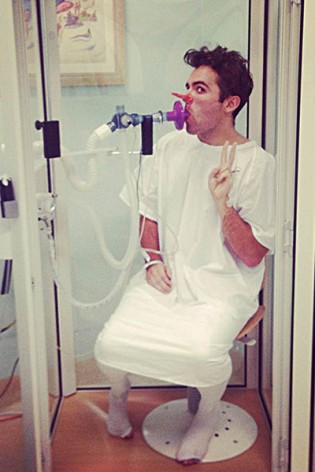Each year in the UK around 2,000 men are diagnosed with testicular cancer. Although relatively uncommon overall, it is the most common cancer to affect younger men in the 15-44 age group. With Testicular Cancer Awareness Month coming up in April, we spoke to two gay men about their experiences of the disease, and asked QX’s resident doctor for medical advice on ‘How Best to Check’.
By Patrick Cash
James Lynch, 23: Student, Sydney
 I’m originally from North London but was brought up in the west of Ireland. I was supposed to embark on my Masters in Commerce at Sydney University a few months ago. It’s been a pretty awful six months since being diagnosed with stage three Testicular Cancer in October 2013. My whole life has changed irrevocably.
I’m originally from North London but was brought up in the west of Ireland. I was supposed to embark on my Masters in Commerce at Sydney University a few months ago. It’s been a pretty awful six months since being diagnosed with stage three Testicular Cancer in October 2013. My whole life has changed irrevocably.
I first noticed something was wrong on my way to work one morning, when I had severe back pain. I initially thought I had torn some muscle or slipped a disc, but as the week progressed and my legs started to swell to the point where I could no longer walk I knew something else was happening
A doctor physically examined my testicles and found nothing wrong with them. It was not until ultrasounds revealed a mass on the right testicle that they were able to diagnose it as a testicular cancer; initially they thought it was sarcoma cancers.
The cancer had spread up through my lymph nodes to develop a much larger tumour in the abdomen, squeezing the vena cava vein, which caused the legs to swell. If I had not experienced back pain, the cancer would have continued to spread to the lungs and other parts of the body. This was the only indication something was wrong as I never felt sick and was exercising daily.
“I had four cycles of treatment over twelve weeks, and it kills so many cells in your body that you are literally brought to the verge of death.”
 Chemotherapy was horrible. I had four cycles of treatment over twelve weeks, and it kills so many cells in your body that you are literally brought to the verge of death. However, it is the most successful way of defeating testicular cancer.
Chemotherapy was horrible. I had four cycles of treatment over twelve weeks, and it kills so many cells in your body that you are literally brought to the verge of death. However, it is the most successful way of defeating testicular cancer.
I would tell anyone who’s just been diagnosed with testicular cancer to think positively every day as positivity is vital in defeating cancer. On those days when you’re sitting in the oncology ward receiving chemotherapy and feeling really down – just look outside the window, see life and remind yourself how beautiful it is and why you are fighting this cancer.
• Read about James’s experience at his blog: onebadtesticle.blogspot.com.au
Timothy Lock, 44
Telecommunications Manager, London
 I was diagnosed when I was 31 following an unintentional soapy self-exam. The cancer was Stage 1, which means it was contained inside the testicle and did not spread to the surrounding tissue. An operation to remove the affected testicle followed, and some post-operation chemotherapy to ensure that the cancer would not return. Today I’m healthy and cancer free with a conversation piece scar, and a bouncy rubber roommate in my scrotum.
I was diagnosed when I was 31 following an unintentional soapy self-exam. The cancer was Stage 1, which means it was contained inside the testicle and did not spread to the surrounding tissue. An operation to remove the affected testicle followed, and some post-operation chemotherapy to ensure that the cancer would not return. Today I’m healthy and cancer free with a conversation piece scar, and a bouncy rubber roommate in my scrotum.
As a guy I did the basic adjusting one’s self beforehand, depending on what trousers or underwear I was wearing. I’m sure we can all relate having nut-munch from time to time. I had never seen any advice on how to check properly, and I think it’s something that should be brought up more in mainstream media. Women are encouraged to examine their breasts for lumps, but there’s not as much emphasis for men to do the necessary scrotal survey.
I can still shoot a big load. They gave me a nifty silicon implant, which is like a mini boob in your ball sack. The only thing to avoid is playing the game of ‘guess which is the real ball’ with sexual partners. They usually guess by squeezing, which can cause your eyes to water when they grab the real one!
I’ve always had a positive outlook on life, and I believe with any problem I encounter there’s always a solution and I will always find the solution.
By Dr Alex Vass
Testicular cancer usually affects guys between the ages of 15 and 44. Catch it early and it is usually curable. Common symptoms are
a painless lump or swelling in the testicles so it’s important to
check your balls, every month or so.
It’s best to do a ball check or TSE (testicular self-examination) to use the correct term, after a shower as the skin of your scrotum is more relaxed.
Use your fingers and thumbs to gently feel each ball. They should be smooth with no lumps or swellings with a soft, tube-like section (the epididymis where sperm is stored) at the top and back of each ball.
Next check the size and weight of each ball. It’s common to have one bigger than the other and one that hangs lower than the other.
If you find a lump or swelling, visit your GP as soon as possible.


















